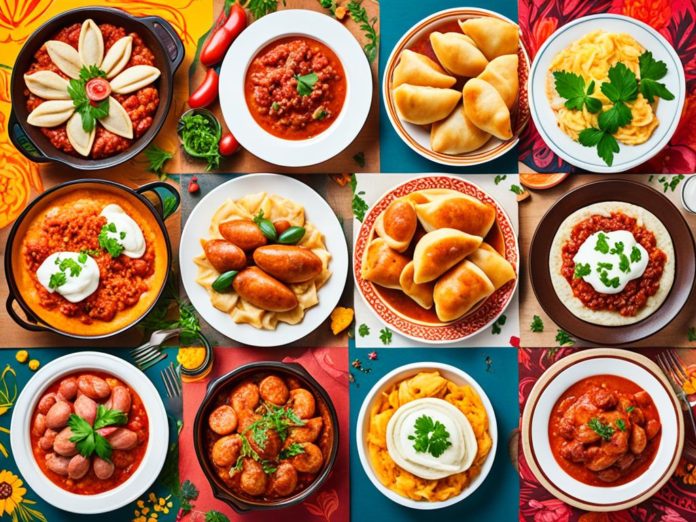Poland is a country full of rich culture. It’s known for its warm people, tasty food, and diverse traditions. From its farming roots to its famous cultural items, Poland mixes the old with the new. This invites visitors to dive into Polish culture.
The Polish people are at the heart of this lively nation. They are known for their strength, kindness, and pride in their heritage. With over 37.5 million people as of 2024, most of them are ethnic Polish. They trace their roots back to Poland’s deep cultural history.
Poland’s food scene is just as exciting, showing off its farming background and neighborly influences. Dishes like pierogi, smoked salmon, and kielbasa sausage are loved worldwide for their unique tastes and cultural importance. Polish sweets like “sernik” cheesecake and “pączki” donuts are also among the best in the world.
Religion is a big part of Polish culture. With 87.2% of people calling themselves Catholic, faith is closely linked to history and everyday life. Celebrating Christian holidays and Name Days shows the Polish people’s deep faith and cultural identity.
The Polish language also brings people together. It comes from the Slavic language family and has changed over time. It shows Poland’s unique history and cultural mix.
Key Takeaways
- Poland is a country with a rich, multicultural heritage, known for its warm-hearted people, delectable cuisine, and diverse traditions.
- The majority of the Polish population (96.9%) are of Polish descent, contributing to a strong sense of national identity.
- Polish cuisine is renowned for its unique flavors, drawing from the country’s agricultural roots and the influence of neighboring cuisines.
- Religion, particularly Catholicism, is deeply ingrained in Polish culture, shaping daily life and traditions.
- The Polish language serves as a unifying force, reflecting the country’s Slavic heritage and cultural influences.
Poland’s Storied History
Poland’s history is filled with both triumph and tragedy. The Auschwitz-Birkenau concentration camp is a somber reminder of the Holocaust. Over one million people lost their lives there. This place shows the horrors of the past and the strength of the human spirit.
The Warsaw Uprising is another key part of Poland’s history. It was a big fight against German rule during World War II. For 63 days, many civilians and soldiers fought to free Warsaw. Even though they didn’t win, their bravery is still celebrated today.
The Solidarity movement also changed Poland’s history. It was a peaceful push for democracy led by Lech Wałęsa. This movement helped bring down communism in Eastern Europe, inspiring others across the region.
| Event | Impact |
|---|---|
| Auschwitz-Birkenau | A somber reminder of the Holocaust, where over one million people were killed |
| Warsaw Uprising | A large-scale armed resistance against German occupation during World War II, showcasing the bravery and determination of the Polish people |
| Solidarity Movement | A peaceful pro-democracy trade union that played a pivotal role in the collapse of communism in Eastern Europe |
Poland’s history is a mix of great suffering and amazing resilience. These events have deeply shaped Poland’s identity and left a lasting impact on the world. They continue to inspire and guide the country’s culture, politics, and history.
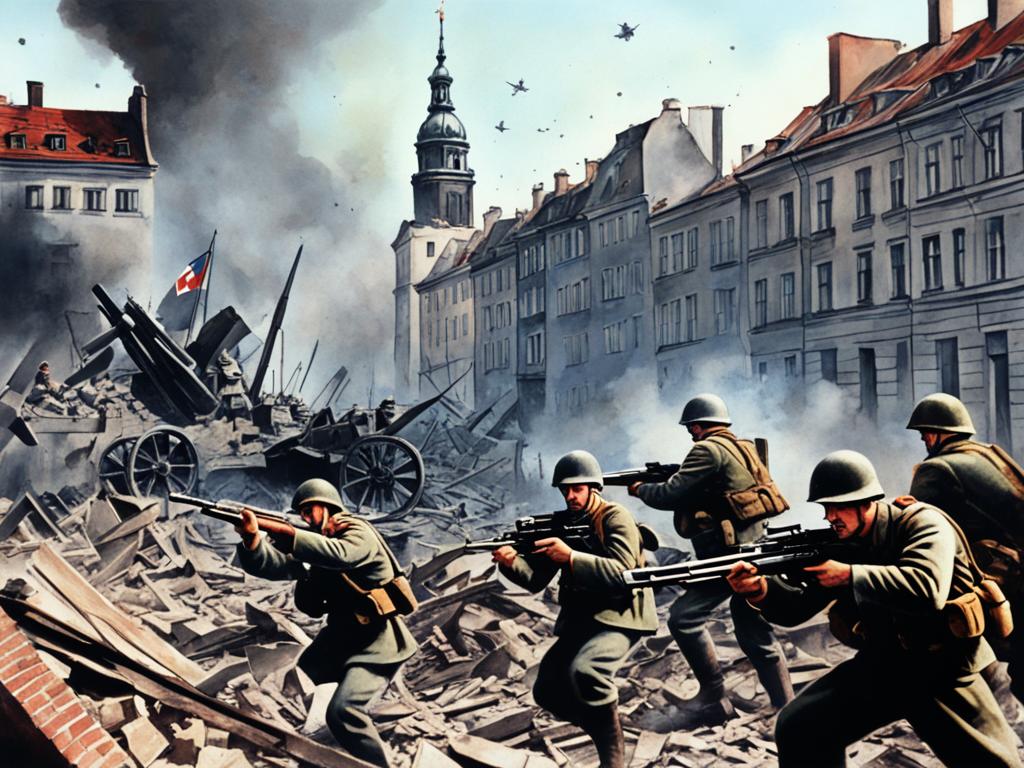
Poland culture: People, cuisine, Religion, Language
Poland’s culture is a mix of its people, food, beliefs, and language. The Polish people are famous for their friendly nature, strong family ties, and overcoming tough times. They make up most of the population, with smaller groups like Germans, Ukrainians, and Belarussians also living there.
Traditional Polish cuisine shows off the country’s farming roots and mix of European and Eastern tastes. Dishes like pierogi, kielbasa, and barszcz are loved around the world. They highlight the skill of making tasty meals with local ingredients.
Christianity, especially Catholicism, is a big part of Polish life. About 89.8% of people call themselves Roman Catholic. The church helps shape the culture and social life of the country.
The Polish language is a key part of Polish identity. It’s part of the West Slavic group and used by most people. It’s a key part of Poland’s cultural heritage.
“The Polish language is an ancient Slavic language with a rich literary tradition dating back to the Middle Ages.”
Poland’s culture is full of warm people, tasty food, deep faith, and a beautiful language. It’s a mix of traditions and stories that grab the attention of the world.
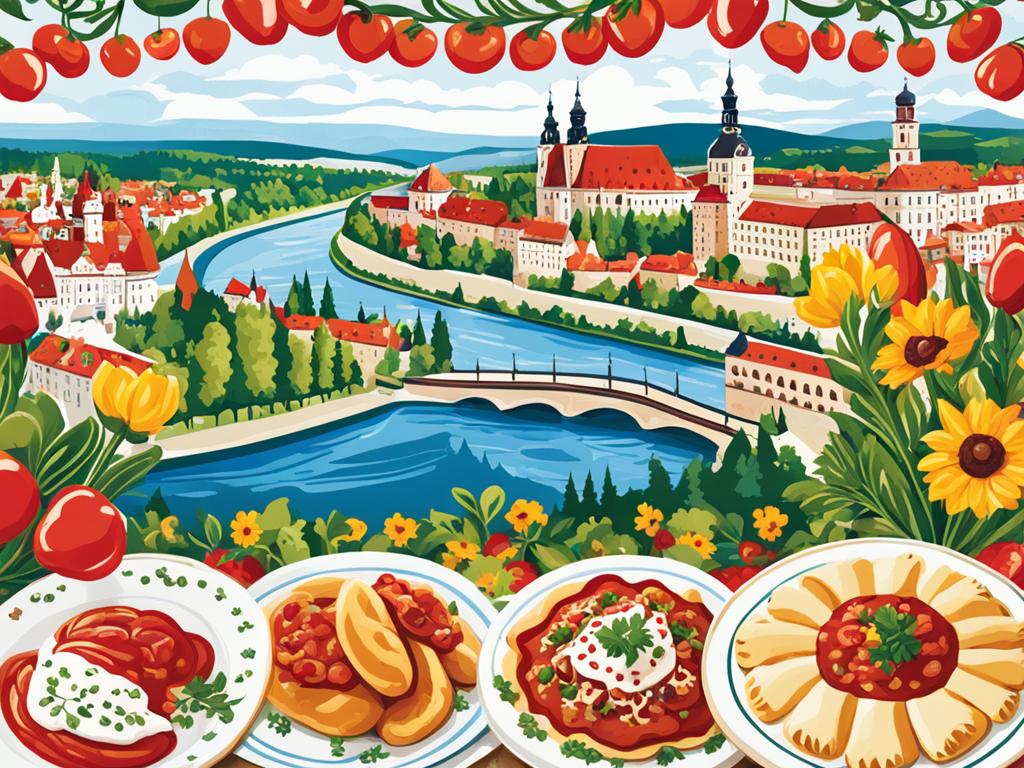
Famous Poles Who Shaped History
Poland has been home to many influential figures who changed the world. Among the most famous are Pope John Paul II and Nicolaus Copernicus. They both left a lasting impact on the world.
Pope John Paul II: A Beloved Pontiff
Pope John Paul II was born Karol Józef Wojtyła in Poland. He was the first non-Italian pope since 1523. He led the Catholic Church for 27 years, fighting for human rights and Polish identity during the Soviet era.
His leadership and moral strength made him a key figure of the 20th century. He is remembered as a beloved pope who helped end communism in Europe.
Nicolaus Copernicus: The Father of Modern Astronomy
Nicolaus Copernicus was a Polish astronomer, mathematician, and physicist. He came up with a model where the Sun is at the center of the universe. This idea changed a lot of old scientific beliefs and is still important today.
He was born in Toruń, Poland, and studied at the University of Krakow and in Italy. Copernicus is seen as a key figure in Poland, and his work in science is recognized worldwide. Many places in Poland, like the Copernicus Science Center in Warsaw, are named after him.
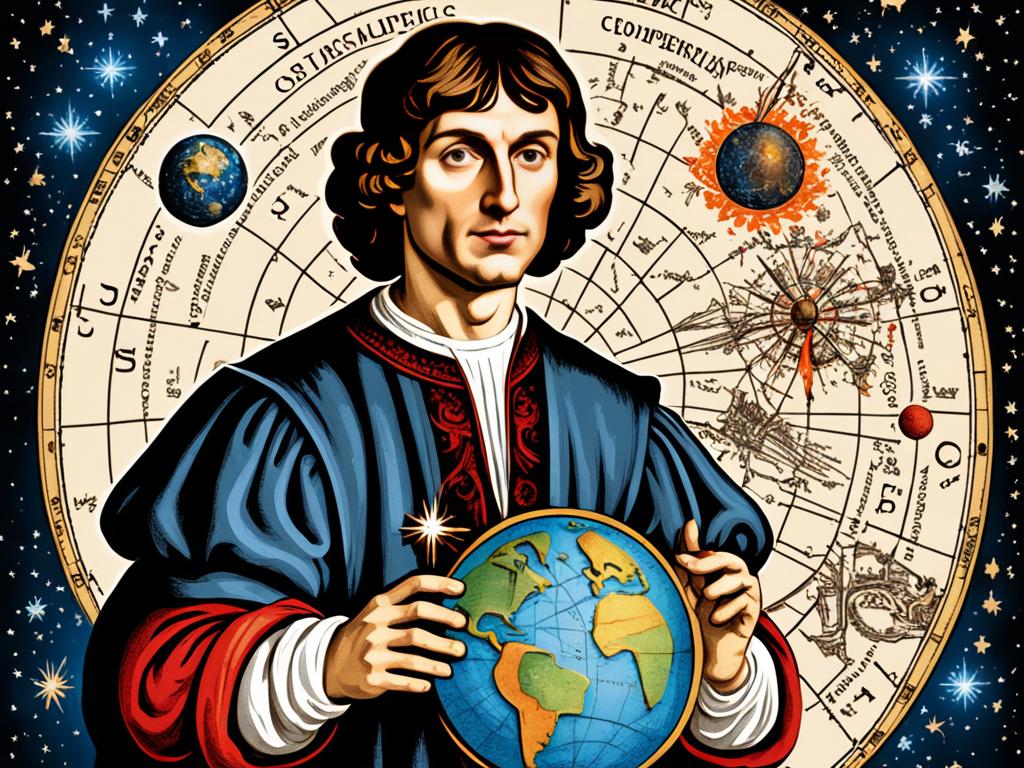
These individuals, along with others like Marie Curie and Frédéric Chopin, have greatly influenced the world. They are a source of pride for the Polish people.
Polish Arts and Culture
Poland’s rich culture shines in its arts, like literature, music, and visual arts. Polish literature has a long tradition, linking to Western civilization. It has produced famous poets and writers, like Adam Mickiewicz and Wisława Szymborska, who won the Nobel Prize.
Literature: A Wellspring of National Expression
Polish literature has a deep history. It has given us famous poets and writers known worldwide. Some key authors include:
- Adam Mickiewicz: Known as Poland’s national poet, his epic poem “Pan Tadeusz” is a key work of Polish Romanticism.
- Juliusz Słowacki: A major figure in Polish Romanticism, his works touch on patriotism, spirituality, and human nature.
- Czesław Miłosz: A Nobel winner in Literature in 1980, his poetry and prose capture the essence of 20th century Poland.
- Wisława Szymborska: The 1996 Nobel winner, her poems offer witty and insightful views on life.
Music: Rhythm and Melody
Poland’s music scene is rich, with famous composers like Frédéric Chopin. Polish music dates back to the Middle Ages, featuring unique styles like the krakowiak and mazurka. The first big Polish opera came in 1794. Stanisław Moniuszko and Frédéric Chopin made significant contributions in the 19th century.
Today, composers like Karol Szymanowski and Witold Lutosławski lead Polish music. Polish jazz is also known for its innovation and quality, thanks to artists like Michał Urbaniak and Leszek Możdżer.
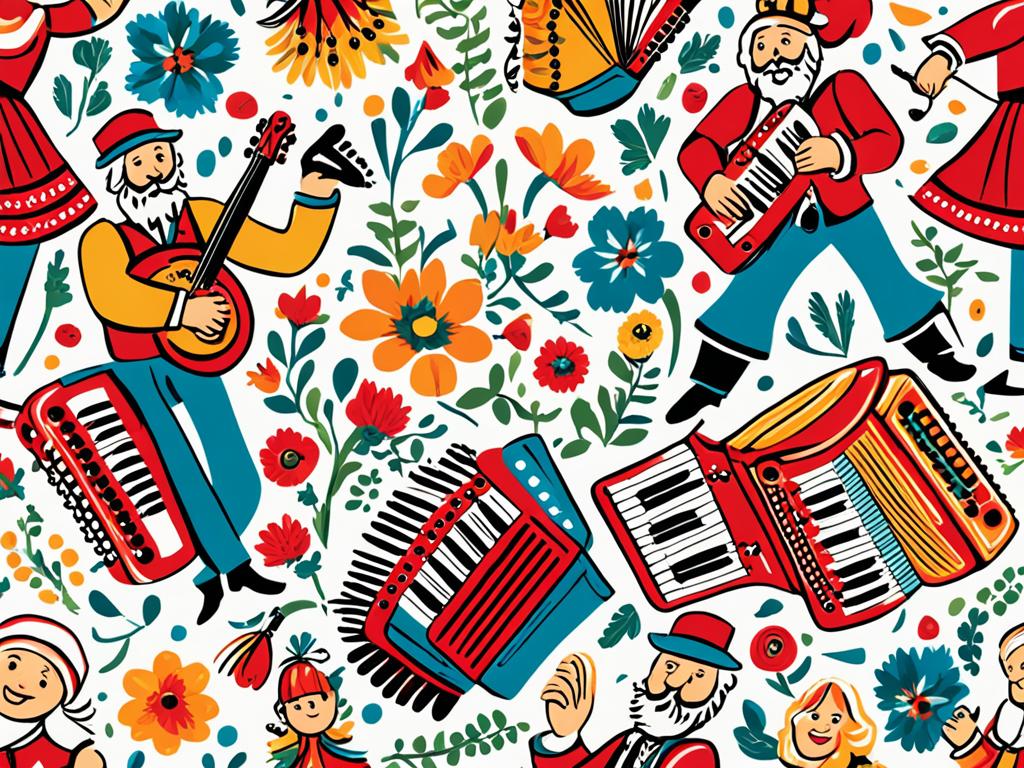
Poland’s visual arts are equally impressive, from medieval architecture to 20th century fiber arts. Its culture shows the resilience and creativity of its people through history.
Conclusion
Poland’s culture is rich, filled with history and tradition. It draws people in with its warm people, tasty food, and lively arts. Exploring Polish culture shows us the unique identity and strength of its people.
This guide has shown Poland’s cultural heritage in all its beauty. It tells us about the country’s past and present. Despite hard times, Poland’s spirit has stayed strong, creating a culture that is both rich and inspiring.
As we end our journey, we hope Poland’s culture has made a lasting mark on you. It’s a mix of tradition, new ideas, and strength. By celebrating Polish culture, we honor its past and look forward to a future where we learn from its story.
